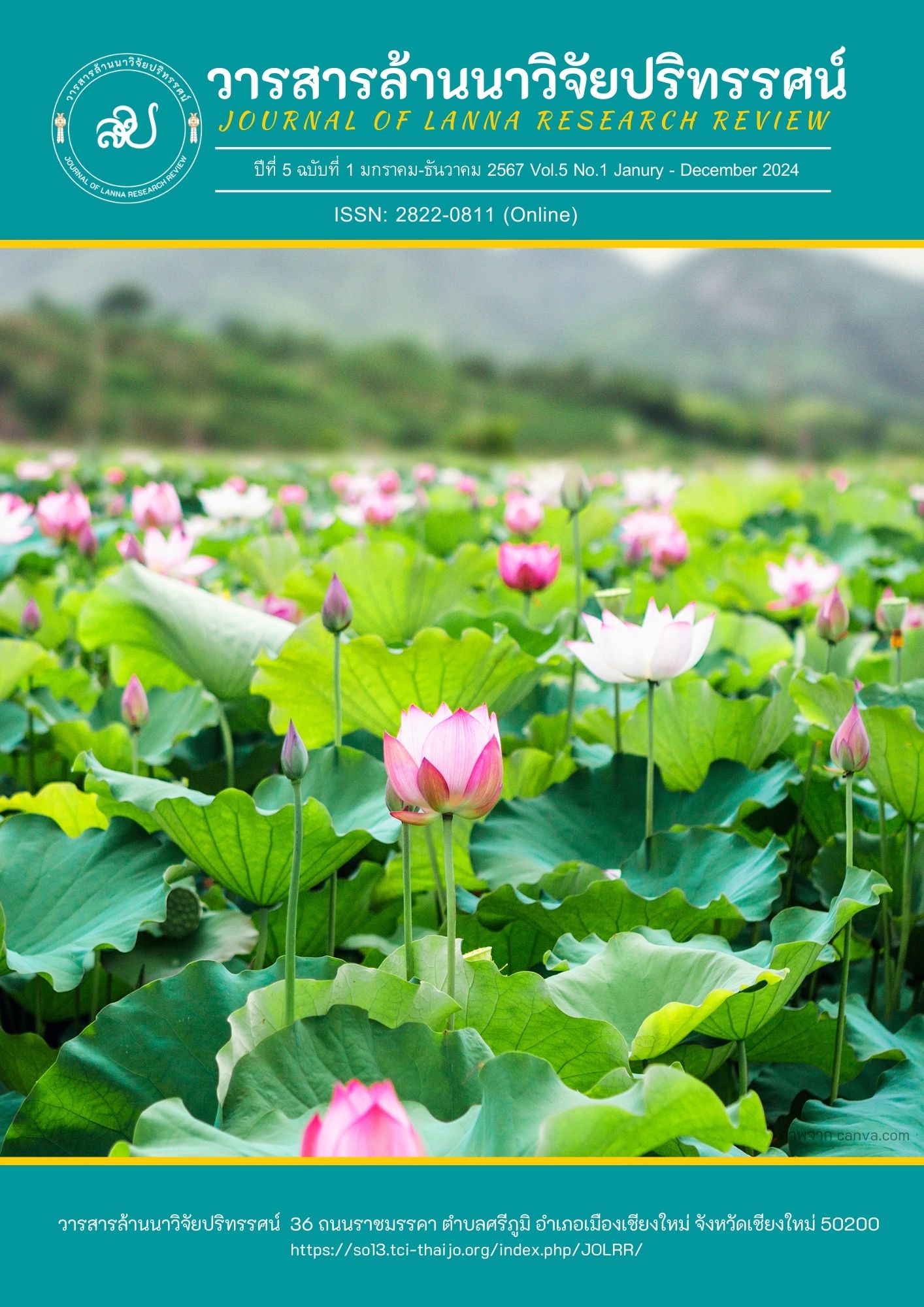GUIDELINES FOR THE DEVELOPMENT OF LEARNING MANAGEMENT BY USING THE FOUR IDDHIPADA PRINCIPLE TO UPGRADE LEARNING PROFICIENCY OF WIANGHAENGPARIYATSUKSA SCHOOL
Keywords:
Learning Management, Four Iddhipada Principles, Guidelines, Academic Achievement, Wiang Haeng Pariyat Suksa SchoolAbstract
The objectives of this article research were: 1) to study the issues related to learning management administration at Wiang Haeng Pariyat Suksa School, Wiang Haeng District, Chiang Mai Province, and 2) to develop guidelines for learning management administration using the Four Iddhipada Principles to Enhance the academic achievement at Wiang Haeng Pariyatti School. This is a qualitative research study, with the primary informants consisting of 9 individuals, including 1 school director, 1 deputy school director, 4 operational teachers, and 3 experts/representatives from the school committee. The research tools used were a structured interview framework to ensure systematic interviews and group discussions. Data analysis was conducted using content analysis.
The results of the research are as follows.
1) Problems in Learning Management: the weaknesses and limitations of Wiang Haeng Pariyat Suksa School, Wiang Haeng District, Chiang Mai Province, can be grouped into four major issues. The primary issue affecting learning management was the lack of effective participation by teachers and staff in the policy-making process and learning management. There was insufficient integration of participatory principles in the ongoing management of learning. Furthermore, the school’s vision, goals, strategies, and standards related to learning management were unclear, which was a critical issue that required urgent attention.
2) Learning Management Using the Four Iddhipada Principles to Enhance Academic Achievement at Wiang Haeng Pariyat Suksa School was found to include the following: 1) Policy formulation in the school’s learning management process by integrating participatory processes of personnel in accordance with the Four Iddhipada principles, and 2) Teaching management and teacher preparation by enhancing learning management skills and solving learning management problems, following the Four Iddhipada principles, which included Chanda (desire or enthusiasm), Viriya (effort or perseverance), Citta (mindfulness or focus), and Vimamsa (critical thinking or wisdom).
References
กระทรวงศึกษาธิการ. (2553). พระราชบัญญัติการศึกษาแห่งชาติ พ.ศ. 2542 และที่แก้ไขเพิ่มเติม (ฉบับที่3) พ.ศ. 2553. สำนักนายกรัฐมนตรี
นันทวัน จันทร์กลิ่น. (2557). การศึกษาปัญหาและแนวทางการบริหารจัดการคุณภาพในการพัฒนาทักษะผู้เรียนในศตวรรษที่ 21 โรงเรียนบ้านเนินมะปราง สำนักงานเขตพื้นที่การศึกษาประถมศึกษา พิษณุโลก เขต 2 [วิทยานิพนธ์ปริญญามหาบัณฑิต ไม่ได้ตีพิมพ์]. มหาวิทยาลัยราชภัฏพิบูลสงคราม.
พระธรรมปิฎก (ป.อ.ปยุตฺโต). (2565). พุทธธรรม (พิมพ์ครั้งที่ 44). บริษัทสหธรรมมิก.
โรงเรียนเวียงแหงปริยัติศึกษา. (2563). แผนพัฒนาคุณภาพการศึกษา ประจำปีการศึกษา 2563-2565. สังกัดสำนักการศึกษาพระปริยัติธรรมแผนกสามัญศึกษา เขต 5.
โรงเรียนเวียงแหงปริยัติศึกษา. (2564). รายงานการประเมินตนเองของสถานศึกษา (SAR). สังกัดสำนักการศึกษาพระปริยัติธรรมแผนกสามัญศึกษา เขต 5.
ศิริ ถีอาสนา. (2557). เทคนิคการจัดการคุณภาพแนวใหม่: แนวคิด หลักการสู่การบริหารจัดการคุณภาพการศึกษา (พิมพ์ครั้งที่ 2). โรงพิมพ์มหาวิทยาลัยราชภัฏมหาสารคาม.
สมพงษ์ เกษมสิน. (2556). การบริหารงานบุคคลแผนใหม่ (พิมพ์ครั้งที่ 7). ไทยวัฒนาพานช.
สมศักดิ์ คงเที่ยง. (2561). หลักการบริหารจัดการแบบมืออาชีพ (พิมพ์ครั้งที่ 4). พิมพลักษณ์.
สำนักส่งเสริมวิชาการและงานทะเบียน มหาวิทยาลัยราชภัฏวไลยอลงกรณ์ ในพระบรมราชูปถัมภ์.(2557). คู่มือการจัดระบบการเรียนการสอนที่ยึดผู้เรียนเป็นสำคัญ (พิมพ์ครั้งที่ 2). ศูนย์เรียนรู้การผลิตและจัดการธุรกิจสิ่งพิมพ์ดิจิตอล มหาวิทยาลัยราชภัฏวไลยอลงกรณ์ ในพระบรมราชูปถัมภ์.
สุภัค ยมพุก และวิโรจน์ เจษฎาลักษณ์. (2558). การบริหารสถานศึกษาและการรับรู้การสนับสนุนการปฏิบัติงานที่ส่งผลต่อประสิทธิผลการสอนของครูโรงเรียนมัธยมศึกษา สังกัดสำนักงานเขตพื้นที่การศึกษามัธยมศึกษา เขต 1 กลุ่มที่ 4. วารสารวิชาการ Veridian E-Journal, Silpakorn University สาขามนุษยศาสตร์ สังคมศาสตร์และศิลปะ, 8(2), 1476-1495. https://he02.tci-thaijo.org/index.php/Veridian-E-Journal/article/view/40325



